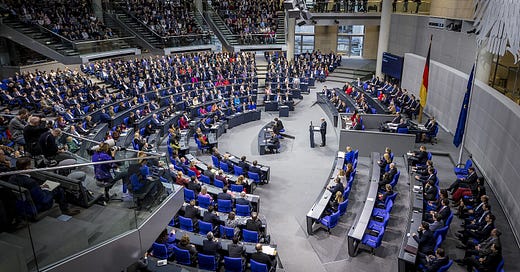Germany’s amended Basic Law hides a bomb. On March 18—just 81 days after its dissolution at the end of December—the German parliament passed one of the most important bills in recent history: a constitutional amendment allowing the government to take on exorbitant new debt. But the real coup wasn’t the debt.
It was a quiet little phrase, buried in Article 143h: “climate neutrality by 2045.” With that line, the Greens installed a battering ram into the legal foundation of the country. One that few have noticed and even fewer understand. Let’s analyze what this move really means through the lens of stratagems.
The classic collection, known as The 36 Stratagems, comes from Chinese military and political tradition. For centuries, it’s been used to decode deception and power plays.
Not to be confused with strategy, a stratagem—usually packaged as a small, memorable story—is a tactical maneuver meant to provoke an error and exploit it.
And in this case, stratagem #1 fits too well:
Deceive The Heavens To Cross The Sea
A group of generals wanted their emperor to finally lead the army across the sea. But the emperor was afraid. So the generals tricked him. They invited him onto a ship under some harmless pretext, and once he was aboard, they launched the entire fleet before he realized what was happening. Out at sea, there was no turning back.
The generals had deceived their emperor to get the army moving and in doing so, crossed the ocean against all odds.
The same method was used to slip the phrase “climate neutrality” into Germany’s Basic Law. According to Friedrich Merz, this addition changes nothing. He claims it simply defines the purpose of the new debt, nothing more. In his view, the clause is harmless. Symbolic.
In other words: writing “climate neutrality” into Germany’s highest legal document has no constitutional effect. But just as the emperor wasn’t tricked onto that boat by accident, this amendment wasn’t inserted without purpose either.
A Battering Ram For De-Industrialization
Every word written into a law, especially something as foundational as a constitution, has weight. It must be carefully balanced and considered. Because once it’s in there, someone will use it.
The law isn’t interpreted according to what some politician says in an interview. It’s interpreted according to the wording itself and the context in which it’s later invoked.
So how can the phrase “climate neutrality” be used? This new amendment creates broad and unpredictable scope for legal action:
Courts may override industrial policy if they decide it contradicts the constitutional goal. Activist NGOs can challenge infrastructure, permits, or legislation that isn’t “net zero enough.” And voters and policymakers lose discretion, because what was once political is now a constitutional imperative.
What looks like a simple phrase today can easily become a legal battering ram tomorrow. And it’s now part of a system that can’t be reversed by public opinion or elections.
Beware of Activist Judges
To be fair, this interpretation isn’t a given. In principle, Merz’s reading might be correct. Maybe the clause really is just descriptive, maybe courts will show restraint.
But you shouldn’t count on it. Judicial restraint can be a flimsy thing. We’ve already seen how far things can go:
In 2021, Germany’s Constitutional Court ruled that today’s insufficient climate protection policies endanger the freedoms and basic rights of tomorrow. It used the existing climate law, combined with the constitution, as a lever to pressure the federal government.
The result? The Merkel administration was forced to tighten its climate targets. Not through a vote, but through judicial interpretation. The boat is already on the ocean. The fleet has set sail, and there’s no turning back. Not for courts, not for industry, not for future governments. The stratagem has worked.
The clause looks harmless. But it moved the system. And that brings us to the possibility that this amendment wasn’t just about climate at all.
ESG Hardwired
ESG flows are tanking in the U.S.—investors pulled $19.6 billion from sustainable funds in 2024—and cooling globally. Green tech is facing profitability headwinds. And institutional investors are starting to ask harder questions.
If you’re part of the Net Zero Industrial Complex™, this is a problem. You don’t want climate goals to live and die with market sentiment or election cycles. So what do you do? You hardwire them. You shift from persuasion to obligation.
You embed your goals into the constitution, where they’re insulated from voter mood and financial underperformance. This clause may be exactly that: a last-ditch fortification for ESG-style governance. Passed just as the tide begins to turn.
Sounds like a conspiracy theory? Maybe. But that’s not even the question.
All About Incentives
Because you don’t need a conspiracy to see how this will play out. All you need are incentives. NGOs—potentially bankrolled by profiteers—will sue. Not necessarily to win, but to delay, block, or force concessions. If I were still inside the Net Zero Industrial Complex™, I’d be drafting a memo right now on how to weaponize this clause.
The result? Courts might side with climate claimants, as they’ve already signaled in past rulings. Investors with exposure to green tech will benefit as the legal system nudges demand in their direction. And industry will foot the bill.
The clause is a camouflaged weapon. And the battlefield is nothing less than the future of German industry. And here’s the thing: to chill investment, you don’t need to win the court cases. You just need enough of them. Enough friction and uncertainty. Delay alone can kill a project.
And there’s another problem. The scales in this situation are heavily tilted in favor of the ESG crowd.
This Ship Has Sailed
Because entropy tends to outpace progress. Lawsuits and economic disruption can snowball quickly, while the benefits of climate neutrality take decades to materialize. In other words, the bad evolves faster than the good. And while climate goals remain abstract, capital gets nervous fast. The moment legal uncertainty creeps in, funding dries up and boardrooms start looking elsewhere.
What looked like a harmless gesture may be the most powerful legal shift in Germany’s postwar industrial history. Not because of what it says, but because of who will use it, and how.
Stratagem #1 teaches us: when someone tells you it’s symbolic, look for the hidden engine. Germany just crossed the ocean. Everyone’s still looking at the sky.
Send this to the last person who said symbols are harmless!






Great article. I enjoyed reading it. I am very familiar with Sun Tzu's The Art of War, but I had never heard of The 36 Stratagems. Well, I am closing that knowledge gap. Thanks!
As for Germany, this seems to mean Germany's de-industrialization will become more and more a certainty. Germany's companies might be able to at least partially navigate this by relocating the production facilities to the US and other countries, something the US, with the new tariffs, is encouraging. It's okay for German companies, great for the US, and bad for Germany's workers. I just wonder why the German government is doing this. Surely they have to foresee this.
Excellent article.